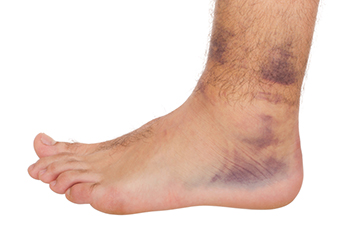Items filtered by date: August 2025
Complications That Can Arise From Peripheral Neuropathy

When the nerves in the feet lose sensation or do not send signals properly, the risk of injury increases. Cuts, blisters, or sores may go unnoticed and can become infected before they are detected. Reduced awareness of temperature can lead to burns from hot surfaces, or frostbite in cold conditions. Balance may be affected, making falls more likely. Over time, untreated injuries and infections can progress to serious tissue damage, sometimes requiring surgical intervention. Chronic pain from nerve damage can also interfere with daily activities, sleep, and overall quality of life. In people with diabetes, these complications are especially concerning, as slower healing can lead to further medical issues. Regular foot checks, wearing protective footwear, and prompt attention to any changes are essential steps in prevention. If you have symptoms of nerve damage, it is suggested that you see a podiatrist for a thorough evaluation and guided advice.
Neuropathy
Neuropathy can be a potentially serious condition, especially if it is left undiagnosed. If you have any concerns that you may be experiencing nerve loss in your feet, consult with Lauryn Smith-Winton, DPM from S.W. Podiatry Group. Our doctor will assess your condition and provide you with quality foot and ankle treatment for neuropathy.
What Is Neuropathy?
Neuropathy is a condition that leads to damage to the nerves in the body. Peripheral neuropathy, or neuropathy that affects your peripheral nervous system, usually occurs in the feet. Neuropathy can be triggered by a number of different causes. Such causes include diabetes, infections, cancers, disorders, and toxic substances.
Symptoms of Neuropathy Include:
- Numbness
- Sensation loss
- Prickling and tingling sensations
- Throbbing, freezing, burning pains
- Muscle weakness
Those with diabetes are at serious risk due to being unable to feel an ulcer on their feet. Diabetics usually also suffer from poor blood circulation. This can lead to the wound not healing, infections occurring, and the limb may have to be amputated.
Treatment
To treat neuropathy in the foot, podiatrists will first diagnose the cause of the neuropathy. Figuring out the underlying cause of the neuropathy will allow the podiatrist to prescribe the best treatment, whether it be caused by diabetes, toxic substance exposure, infection, etc. If the nerve has not died, then it’s possible that sensation may be able to return to the foot.
Pain medication may be issued for pain. Electrical nerve stimulation can be used to stimulate nerves. If the neuropathy is caused from pressure on the nerves, then surgery may be necessary.
If you have any questions, please feel free to contact our office located in Waldorf, MD . We offer the newest diagnostic and treatment technologies for all your foot care needs.
Plantar Warts Can Be Treated!
Causes of and Risk Factors for Gout

Gout is a form of inflammatory arthritis that typically affects the feet, especially the big toe joint. It occurs when uric acid builds up in the blood and forms sharp crystals in the joints, often causing sudden, severe pain, swelling, and warmth. This buildup may result from the kidneys not eliminating enough uric acid or from consuming foods that are high in purines, such as red meat, organ meats, certain seafood, and alcohol. Risk factors for gout include being overweight, having a family history of gout, or living with kidney disease, diabetes, or heart disease. Gout tends to appear more often in men over 40, and in women after menopause. A podiatrist can assist by diagnosing gout through imaging or joint fluid analysis and offering foot-specific treatment strategies. If you are experiencing symptoms of gout, it is suggested that you promptly schedule an appointment with a podiatrist for an exam and effective management tips.
Gout is a painful condition that can be treated. If you are seeking treatment, contact Lauryn Smith-Winton, DPM from S.W. Podiatry Group. Our doctor will treat your foot and ankle needs.
What Is Gout?
Gout is a form of arthritis that is characterized by sudden, severe attacks of pain, redness, and tenderness in the joints. The condition usually affects the joint at the base of the big toe. A gout attack can occur at any random time, such as the middle of the night while you are asleep.
Symptoms
- Intense Joint Pain - Usually around the large joint of your big toe, and it most severe within the first four to twelve hours
- Lingering Discomfort - Joint discomfort may last from a few days to a few weeks
- Inflammation and Redness -Affected joints may become swollen, tender, warm and red
- Limited Range of Motion - May experience a decrease in joint mobility
Risk Factors
- Genetics - If family members have gout, you’re more likely to have it
- Medications - Diuretic medications can raise uric acid levels
- Gender/Age - Gout is more common in men until the age of 60. It is believed that estrogen protects women until that point
- Diet - Eating red meat and shellfish increases your risk
- Alcohol - Having more than two alcoholic drinks per day increases your risk
- Obesity - Obese people are at a higher risk for gout
Prior to visiting your podiatrist to receive treatment for gout, there are a few things you should do beforehand. If you have gout you should write down your symptoms--including when they started and how often you experience them, important medical information you may have, and any questions you may have. Writing down these three things will help your podiatrist in assessing your specific situation so that he or she may provide the best route of treatment for you.
If you have any questions, please feel free to contact our office located in Waldorf, MD . We offer the newest diagnostic and treatment technologies for all your foot care needs.
Treating a Sprained Ankle

A sprained ankle happens when the ligaments that support the joint are stretched or torn, usually from a sudden twist or fall. This injury can cause pain, swelling, and a feeling of instability. It may be hard to walk or put weight on the affected foot. The level of damage can vary from a mild stretch to a complete tear. Early care makes a difference in how well and how quickly the ankle heals. Rest helps reduce swelling. Elevating the ankle and avoiding weight-bearing activities can prevent further damage. Supportive wraps or braces may be helpful, and trying to walk too soon can delay healing. If your ankle remains swollen or unstable, it is suggested you schedule an appointment with a podiatrist for a full evaluation and appropriate treatment.
Ankle sprains are common but need immediate attention. If you need your feet checked, contact Lauryn Smith-Winton, DPM from S.W. Podiatry Group. Our doctor can provide the care you need to keep you pain-free and on your feet.
How Does an Ankle Sprain Occur?
Ankle sprains take place when the ligaments in your ankle are torn or stretched beyond their limits. There are multiple ways that the ankle can become injured, including twisting or rolling over onto your ankle, putting undue stress on it, or causing trauma to the ankle itself.
What Are the Symptoms?
- Mild to moderate bruising
- Limited mobility
- Swelling
- Discoloration of the skin (depending on severity)
Preventing a Sprain
- Wearing appropriate shoes for the occasion
- Stretching before exercises and sports
- Knowing your limits
Treatment of a Sprain
Treatment of a sprain depends on the severity. Many times, people are told to rest and remain off their feet completely, while others are given an air cast. If the sprain is very severe, surgery may be required.
If you have suffered an ankle sprain previously, you may want to consider additional support such as a brace and regular exercises to strengthen the ankle.
If you have any questions please feel free to contact our office located in Waldorf, MD . We offer the newest diagnostic tools and technology to treat your foot and ankle needs.
Caring for Foot Health in Older Adults

As the body ages, the feet often experience changes that can lead to chronic pain, limited mobility, balance problems, and abnormal gait. Common foot issues in older adults include plantar fasciitis, heel pain, and osteoarthritis, all of which may affect daily activities and independence. Thinning fat pads, reduced circulation, and stiff joints can increase discomfort and the risk of falls. A podiatrist can provide regular foot evaluations, recommend supportive footwear, manage pain, and treat underlying conditions to help maintain mobility and safety. If you or a loved one is experiencing foot discomfort or difficulty walking, it is suggested that you consult a podiatrist who can treat various foot conditions, ensuring continued comfort, stability, and quality of life.
Proper foot care is something many older adults forget to consider. If you have any concerns about your feet and ankles, contact Lauryn Smith-Winton, DPM from S.W. Podiatry Group. Our doctor can provide the care you need to keep you pain-free and on your feet.
The Elderly and Their Feet
As we age we start to notice many changes in our body, but the elder population may not notice them right away. Medical conditions may prevent the elderly to take notice of their foot health right away. Poor vision is a lead contributor to not taking action for the elderly.
Common Conditions
- Neuropathy – can reduce feeling in the feet and can hide many life-threatening medical conditions.
- Reduced flexibility – prevents the ability of proper toenail trimming, and foot cleaning. If left untreated, it may lead to further medical issues.
- Foot sores – amongst the older population can be serious before they are discovered. Some of the problematic conditions they may face are:
- Gouging toenails affecting nearby toe
- Shoes that don’t fit properly
- Pressure sores
- Loss of circulation in legs & feet
- Edema & swelling of feet and ankles
Susceptible Infections
Diabetes and poor circulation can cause general loss of sensitivity over the years, turning a simple cut into a serious issue.
If you have any questions, please feel free to contact our office located in Waldorf, MD . We offer the newest diagnostic and treatment technologies for all your foot care needs.

